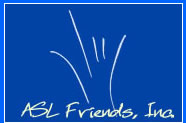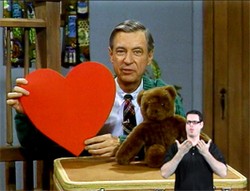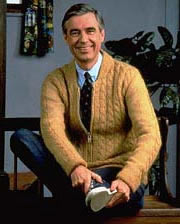
 |
|
 
|
DVD
 |
|||||||||||||||
It’s a beautiful day in the Neighborhood. -Fred Rogers
DVD: Mister Rogers’ ASL Friends “Love”
In this special edition of Mister Rogers’ Neighborhood, Emmy Award winner and Pittsburgh native Mary Lou Novitsky and Roger Vass provide expert Deaf signing in American Sign Language.
Different aspects of love are explored from the many ways to say “I love you” to helping children know that angry times don’t make the love go away. Mister Rogers talks about the people and things we love.
- Mister Rogers' Neighborhood
- Fred Rogers
- James DeBee
“I like you just the way you are.” This was a common message shared by Fred Rogers with children of all ages through his television program, Mister Rogers’ Neighborhood. Speaking directly to the camera, as well as interacting with neighbors and puppets, Mister Rogers’ discussions promote emotional growth, character development and learning in a meaningful and welcoming way. The program explores topics that are relevant to children through real-world situations and through stories that take place in the Neighborhood of Make-Believe. Regardless of the content of each program, Mister Rogers’ overriding theme is that everyone is special.
"Fred Rogers was a pioneer in children's television who created a place where children feel safe, respected and cared for. For more than forty years Mister Rogers has served as a trusted guide to help children learn about themselves, their neighbors and the world around them."
http://video.pbs.org/program/mister-rogers
http://pbskids.org/rogers/videos/index.html
 Creator, Mister Rogers' Neighborhood - Fred Rogers
Creator, Mister Rogers' Neighborhood - Fred Rogers
It meant a great deal to Fred Rogers knowing that Mister Rogers' Neighborhood would one day be accessible to deaf and hard-of-hearing children through American Sign Language. The idea was first brought to his attention in 1992 and has evolved into a project hopefully worthy of the legacy of Fred Rogers.
His powerful message of self-worth and valuing your neighbor continues to be woven into the fabric of our nation. Among the many awards Fred Rogers won through the years, the "Lifetime Achievement" Awards from the National Academy of Television Arts and Sciences and the TV Critics Association underscored the impact of his over 30 years of Mister Rogers' Neighborhood programming.
In 2002, President George W. Bush presented him with the Presidential Medal of Freedom, the nation's highest civilian honor, recognizing his contribution to the well-being of children and a career in public television that demonstrates the importance of kindness, compassion and learning.
Fred Rogers was chairman of Family Communications, Inc. the nonprofit company that he formed in 1971 to produce Mister Rogers' Neigborhood and that has since diversified into non-broadcast materials that reflect the same philosophy and purpose: to encourage the healthy emotional growth of children and their families. Mister Rogers' Neigborhood is the longest-running program on public television. Today Family Communications, Inc. is called The Fred Rogers Company in honor of its founder.
 Director/Producer/Editor - James DeBee
Director/Producer/Editor - James DeBee
James DeBee has been with the Mister Rogers’ ASL Friends project since 1996 when he suggested that Deaf signers be used instead of a hearing interpreter. This concept combined with DeBee’s expertise in production have contributed significantly to the project’s success.
In 1985, DeBee garnered two "ACE" awards, the National Cable Television Association's Emmy, as best television series for special audiences and outstanding programming achievement for The Los Angeles Club for the Deaf Story documentary depicting the rise and fall of a well-known Deaf club.
Founder of DeBee Communications Corporation, his vision is to promote positive and realistic videotapes and films, especially about Deaf people, their language, culture, and so forth, and to provide accurate cultural information which may clear up many damaging myths and stereotypes.
By expertly directing Deaf signers through the ASL adapted script and meticulously editing the signers onto the original Mister Rogers' Neighborhood episode, DeBee established the format for future Mister Rogers’ ASL Friends productions by leading the pilot project from start to finish.
James DeBee is a Pittsburgh native and graduate from the Western Pennsylvania School for the Deaf. He currently lives with his wife, Joanne and their three daughters in New Mexico.
Viewing Tips
- Watch with your child if you can. Mister Rogers often asks questions or leaves silent time for children to think about what he’s said. When you are nearby you can observe your child’s reactions. Just having you there can make something more meaningful for your child.
 Suggest play or activities from the ideas offered on the program.You’ll find lots of ideas in the things Mister Rogers shows and does. The Mister Rogers’ Plan & Play Book offers ideas and activities to match every program
Suggest play or activities from the ideas offered on the program.You’ll find lots of ideas in the things Mister Rogers shows and does. The Mister Rogers’ Plan & Play Book offers ideas and activities to match every program
- Discuss the program with your child. Discuss what happened during the program. How do they think a person or puppet felt? Have they ever felt that way? When you listen to your child’s ideas and when you share your own, you’re saying “I care about you.”
- Use the Neighborhood in everyday situations. Because Mister Rogers sings and talks about common experiences in childhood, you might find many times during the day when you can refer to his songs, his “important talk” and other things that have happened during his visits in your home.
-
Mister Rogers’ Neighborhood was intended for the preschool audience of 3-5 year olds. Our research shows that deaf and hard-of-hearing children between 3 and 8 years of age may benefit from the program with American Sign Language (ASL).
-
If a child is too young to view the program, parents and family members may benefit by viewing the Mister Rogers’ ASL Friends DVD to learn ASL.
-
Remember, your infant or toddler will understand your signs before they express their own signs. YOU are their language model and first teacher!
- Autistic individuals and those with Down Syndrome may find expression through American Sign Language. A Mister Rogers Neighborhood DVD "Friends and Feelings" has been developed exclusively for autistic children.
- We are reminded that families of all ages benefit from Mister Rogers' ASL Friends. In addition, interpreters, teachers, and sign language students have had shared positive experiences viewing Mister Rogers' ASL Friends.
-
Allow your child access to the Mister Rogers’ ASL Friends DVD so he or she can choose to view it.
-
When you view the program together, allow your child to initiate communication by asking a question or sharing a comment first. This is a good time to add to his or her knowledge with a new sign.
Respect your child if he or she prefers not to communicate during the program.
-
If your child walks away or shows little interest in the program, turn the TV off and explore other activities until another time.
-
You may want to experiment with sitting down for 30-minutes each day and watching the Mister Rogers' ASL Friends DVD to see if your child joins you.
-
It is a natural phase in early childhood, especially when acquiring language, for a child to repeat and repeat and repeat words or phrases and/or signs.
-
Your child may ask to view the Mister Rogers' ASL Friends DVD again and again! This can be healthy, but take breaks between programs.
-
"The American Academy of Pediatrics strongly discourages television viewing for children ages two years old or younger and advises no more than one or two hours per day of educational, nonviolent programs for older children." *
* Retrieved from Where We Stand: TV Viewing Time (July 30, 2012). -
Monitor the amount of screen time your child spends each day. Screen time includes: TV, movies, video games, computers, cell phones, ipads, ipods, etc...
 Frequently Asked Questions
Frequently Asked Questions
Mister Rogers’ Neighborhood has been closed captioned since 1988 (program #1461). Although the program was intended for preschool children between the ages of 3-5 years, most of these emergent readers are unable to read captions fluently. Deaf and hard-of-children often experience language delays making reading captioning inaccessible. English is not the first language of Deaf children who use ASL.
For over 40 years, Mister Rogers’ Neighborhood has successfully addressed the issues in childhood development in a simple and profound way. ASL Friends, Inc. believes strongly that Fred Rogers’ messages of self worth and valuing your neighbor are as important today as ever before.
Fred Rogers communicated in special ways with children. He used slow and deliberate speech, often showed the item he was talking about, and created natural pauses. These methods are also effective in teaching English as a Second Language. Non-native speakers have learned to speak English by viewing Mister Rogers’ Neighborhood.
The Mister Rogers’ ASL Friends pilot episode is not captioned. There is not enough space on the screen for both captioning and multiple signers.
The next Mister Rogers' ASL Friends production will be one-week of programming or 5, 30-minute episodes. Each week of Mister Rogers' Neighborhood is a theme of childhood such as "Love," "Anger," "Friends," etc.
Home | About Us | DVD| Research | Support | Contact
ASL Friends Inc. ©2018
PO Box 31
• Wexford, PA 15090 • contact@aslfriends.org